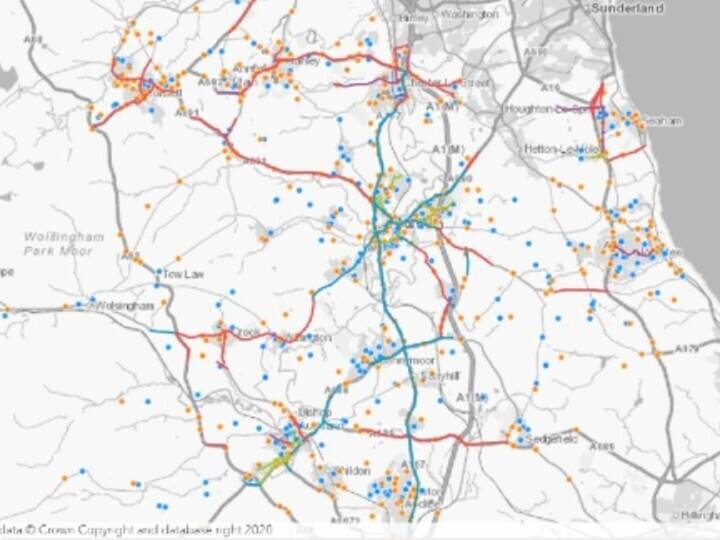Exemplar Award Winner- Runner-up National Gazetteers Green Award 2011: Nottingham City Council
Mapping a greener future In 2010-11, the Department of Energy and Climate Change (DECC) ran a pilot programme with nine local authority areas to co-design a series of Local Carbon Frameworks to identify what works at what level, and to develop templates for action on carbon by all local authorities.
Nottingham City Council received funding under this initiative in order to create a knowledge base, facilitate deep cuts in carbon emissions, transfer learning, and generate a tool set. Working with the Nottingham Energy Partnership and other selected organisations, Nottingham City Council set about designing and delivering a citywide energy map.
Outcomes
Nottingham started the low carbon transition from a position of strength. Between 2003 and 2006, the city reduced domestic gas consumption by 16%, the greatest reduction of all local authorities in the East Midlands and of all the core cities; while, in 2006, 3% of heat and power was generated from renewables and waste, making Nottingham the most energy self-sufficient city in the UK.
The energy mapping project funded by the DECC will reinforce Nottingham’s key energy ambitions: to reduce 2005 carbon dioxide emission by 26%, and to generate 20% of all energy and heat from low carbon and renewable sources. This would lead to an overall contribution to the council’s wider long term green vision.
Nottingham’s Energy Strategy articulates which technologies are available to support these targets and how much of them should be used. The main objective of the energy mapping project was to develop tools that would help define where these technologies could be deployed, and to ensure investment to maximise their potential. This was achieved by:
• combining DECC methodology with new approaches to develop a robust evidence base, with data sourced and processed at a property level, to provide the necessary information to perform option appraisals
• developing a web based ‘Decision Support System’ (DSS) to model scenarios and inform decisions on energy generation and demand by the council and its partners
• implementing a web based ‘Energy Calculator’ tool to support property level assessment and cost estimation by citizens of solar energy generation and energy efficiency opportunities.
The LLPG was fundamental to the online mapping project as it provided a definitive and reliable list of properties within Nottingham. In addition, the LLPG was used to identify multiple occupancy dwellings: a vital input for solar energy generation mapping and energy efficiency scenario modelling. The LLPG also allowed for the classification of properties supporting wind and non-domestic energy mapping, and to filter results when using the Decision Support System.
Using the LLPG Unique Property Record Number (UPRN), additional information could also be integrated within the project to inform results. This included property tenure information, created from a range of datasets, including council tax records, Registered Social Landlords list and Nottingham Energy Partnership survey results, as well as third party demographic profiles.
As a result of this project, the council now has a property level dataset that includes: the UPRN; property type; building footprint area; average building height; building volume (including property volume where flats are present); gas supply flag; property age; property tenure; solar energy generation calculations; viability flags, and much more. This means that any property can be assessed for its suitability for renewable energy installations and energy saving measures.
The online tools allow for this information to be accessed by partner organisations, residents, community groups and businesses, increasing awareness and understanding of low carbon technologies. It is hoped that this will support individuals and communities adopting these solutions, encouraging personal action and accountability and supporting Nottingham in meeting its Sustainable Community Strategy targets.
Key benefits
• citywide property level database to aid decision making in support of environmental targets
• development of a set of online tools to analyse the availability, suitability, costs and savings of renewable energy installations and energy saving measures at an individual property level
• creation of a solution that is being marketed at other local authorities and environmental organisations
• significant savings achieved through the use of the LLPG.



